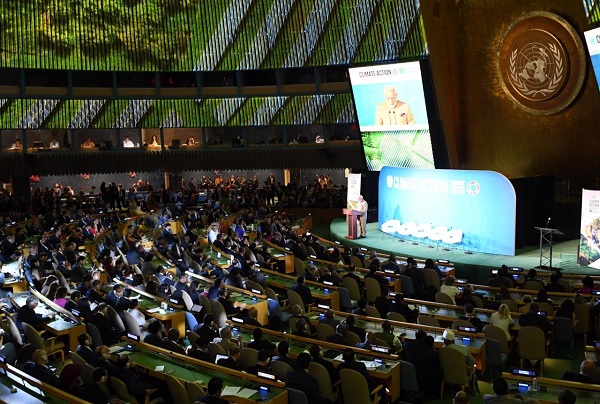
New York, As the world gathered for the Climate Action Summit here, partners of the Cool Coalition announced major new commitments on efficient, climate-friendly cooling which can make a huge positive impact on climate change, help achieve sustainable development and save trillions of dollars.
Commitments announced on Monday include governments promising to develop comprehensive national cooling plans, major companies in the cooling industry pledging to cut the emissions of their products, and donors providing new funding.
Catalyzed by the Kigali Cooling Efficiency Programme, the Cool Coalition — a global network connecting over 80 partners from the private sector, government, cities, international organisations, finance, academia and civil society — was set up in April 2019 and works to expand access to cooling while reducing the climate impact.
The cooling challenge has been referred to as a “blind spot” in climate action, which must increase at least fivefold to keep the global temperature rise this century to 1.5AoC.
By taking forward an unprecedented and coordinated surge of activity to make efficient, climate-friendly cooling accessible for all, the Cool Coalition is responding to the UN Secretary-General’s call for accelerated climate action.
Over one billion people presently face immediate risks from a lack of cooling, and a warming planet means this number will only increase.
But cooling actually contributes to heating the planet. By 2050, space cooling alone will consume as much electricity as China and India today and much of the world’s projected renewables capacity.
But according to the latest research, moving to best available technologies would reduce cumulative emissions by 38 -60 GtCO2e by 2030 and up to 130-260 GtCO2e by 2050.
“Three years ago, the world adopted the Kigali Amendment to the Montreal Protocol to phase out the hydrofluorocarbon greenhouse gases used in cooling,” said Vincent Biruta, Minister of Environment of Rwanda.
“If successfully implemented, the Kigali Amendment, coupled with better energy efficiency, will avoid a full one degree of warming by the end of the century. Efficient cooling is essential to achieving the targets of the Paris Agreement.”
“Getting cooling right offers a three-in-one opportunity to cut global warming, improve the lives of millions of people, and realize huge financial savings,a said UN Environment Programme (UNEP) Executive Director Inger Andersen.
“The Cool Coalition is a powerful new collective force for realizing these and many other benefits. UNEP is delighted to be working with such a wide range of stakeholders to accelerate the transition towards efficient, climate-friendly cooling for all.”
The pledges issued in support of the Cool Coalition include 26 countries, including Bangladesh and the Philippines, will adopt comprehensive national cooling plans.
Led by France, several countries are committing to the Biarritz Pledge for Fast Action on Efficient Cooling.
Five countries — the Dominican Republic, North Macedonia, Rwanda, Senegal and Spain – on Monday committed to integrate cooling in their Nationally Determined Contributions.
Additional countries making cooling-related pledge are: Andorra, Chile, Costa Rica, Denmark, Djibouti, Hungary, Japan, Lebanon, Norway and Britain.
The World Bank Group and the Green Climate Fund are integrating clean and efficient cooling across their lending and investment portfolios.
The Children’s Investment Future Fund has pledged an additional $20 million in funding for cooling, bringing K-CEP funding to over $60 million.
C40 cities, including Copenhagen, Medellin and Barcelona, will work with their network of more than 90 member cities to share expertise and integrate urban cooling into their climate action plans to reduce energy consumption while improving air quality.
Danfoss, Electrolux and Mabe will publicly release plans by the end of 2019 to switch to lower global warming potential refrigerants in all of their cooling product lines.
Engie plans to invest between 1.8-2.0 billion euros in highly efficient District Cooling systems by 2024.
Others will scale up pilot projects – for example, EMPOWER will support projects in 10 new cities and Tabreed will invest in cooling efficiency innovations in seven countries.









